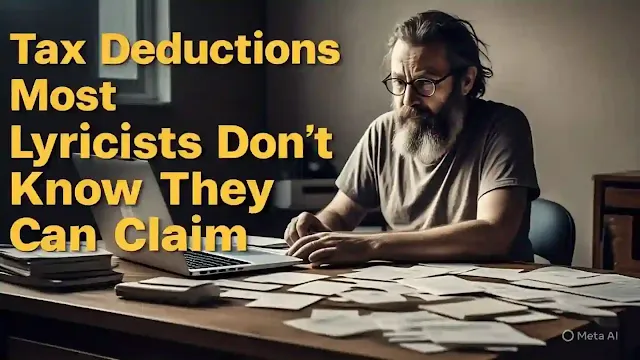If you’re a lyricist
or songwriter, chances are you’ve poured cash into mics, laptops, studio space,
or even songwriting apps. But did ya kno' a huge chunk of that spend could be
deductible? Many creatives leave money on the table come tax time—simply bcoz
they don’t realize just how many tax breaks apply to their lyrical hustle.
In a world where even
royalties might not feel enough, knowing how to legally write off your
work expenses can boost your net income faster than a viral TikTok line.
1. Home Studio
& Workspaces
Got a corner of your
room turned into a writing cave? That counts. If you use part of your home
exclusively for songwriting or biz-related tasks (like managing contracts), the
home office deduction might apply. This includes rent, utilities, and
even part of your Wi-Fi bill.
As discussed in this deep dive on lyricist business setups, your structure
(LLC vs. sole proprietorship) can impact how you file and what deductions
you're eligible for.
2. Gear &
Equipment
Whether it’s a
beat-making app, a $200 microphone, or lyric-writing software, these tools are business
assets. You can deduct:
- Microphones
- Audio interfaces
- Studio monitors
- Software subscriptions (like MasterWriter
or Ableton)
- Notebooks & pens (yes, even those)
Even the costs of
services like SoundBetter for collaborative work or audio engineering
can be partly written off. ASCAP’s guide to deducting music equipment goes into
more IRS-backed detail.
3. Music
Distribution Fees
Did you pay DistroKid
or TuneCore to get your songs on Spotify and Apple Music? Those are biz
expenses. If your old tracks are generating passive income, you're running a
business, and you should be tracking distribution costs like any online
entrepreneur.
One way to maximize
old content is by exploring royalty strategies, as outlined in "How to
Turn Old Songs Into Monthly Income Without Writing a New Line."
4. Travel for Gigs,
Writing Retreats, or Music Conferences
If you've ever flown
across states for a collab, taken a roadtrip to Nashville, or attended a
songwriting retreat, those costs could be deductible too. We're talkin’
flights, meals (50%), hotel stays, car rentals—all under biz expenses if the
trip's primary purpose was music-related.
Even if you're just
writing about the business like in “Patti LuPone’s Apology: A Lesson in Branding”, that work
becomes part of your creative brand, making research travel part of the tax
conversation.
5. Marketing and
Promotion Costs
Think ads don't
matter? If you’ve run Instagram ads to push your lyrics page, hired a freelance
designer for a cover, or printed flyers to promote your poetry nights—those
expenses can be claimed. SEO services, branding consultations, and website
hosting fees? Yep. All part of the game.
Speaking of promo, check out how lyricists earn through Shopify by selling lyric
sheets and merch. All those promotional expenses should be tracked.
6. Legal &
Financial Services
Registered for a
copyright? Hired an attorney to draft your licensing agreements? Paid a CPA to
do your taxes (ironic, but yep)? These services are tax-deductible too. You can
even write off subscriptions to music law newsletters or royalty calculation tools.
And if you’re
considering insurance to protect your intellectual property, here’s a smart
read: “How Insurance Protects Your Lyrics and Royalties”. Many
musicians overlook these professional service write-offs.
7. Education &
Skill Development
Took a songwriting
masterclass? Paid for online workshops or lyric critique groups? Those are
investments in your craft and count as professional development. Webinars,
books on songwriting finance, and even Udemy courses are deductible.
Our blog on "7 Money Lessons from Music That Made Rappers Millions"
talks about the value of financial literacy and training. Even that audiobook
about music publishing counts.
Don’t Let the IRS
Eat Your Rhymes
If you’re earning,
even sporadically, from your lyrics—you're a business. That means you should
act like one. Start trackin' your expenses, keep receipts, use simple tools
like Wave Accounting or QuickBooks Self-Employed, and talk to a
tax pro familiar with creative professionals.
Most importantly,
don’t sleep on opportunities to protect and expand your income. The line
between art and finance is thinner than you think.
For more ways to earn from your rhymes, dive into our popular post: “Monetize Your Rhymes: Smart Ways to Make Money from Lyrics”.


.png)







%20in%20flashy%20clothes.webp)



0 Comments
Please don't enter any spam link in the comment box